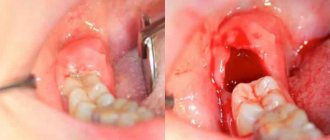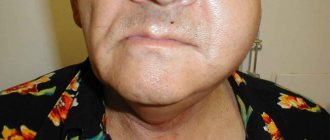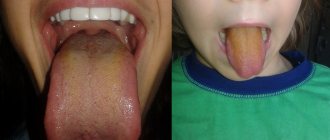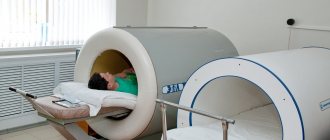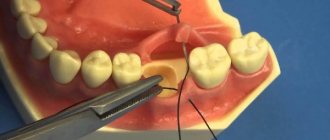Anatomical background
A sore throat rarely occurs after other teeth have been removed. To understand why such a clinical picture occurs in the case of wisdom teeth, you need to understand some anatomical nuances:
- they are located closest to the throat;
- have four rather than three roots;
- place of attachment to the jaw bone in close proximity to the trigeminal nerve;
- the roots are often oriented in different directions or may be curved.
All these factors contribute to the fact that soon after a person leaves the dentist, he begins to feel pain.
Checking yourself for a sore throat
Removing third molars (wisdom teeth), especially those located on the lower jaw, is a difficult and traumatic procedure. This is explained by the fact that they lie quite deep, and the bones and soft tissues of adults have a greater density.
The presence of three curved roots explains the large wound surface after the intervention. Often the nerve is damaged during removal. The body's predicted reaction is pain.
The patient is concerned about pain on the extraction side, swelling of the mucous membrane and tonsils, a feeling that the tooth hurts and radiates to the throat.
The symptoms can be so strong that they can easily be confused with the first signs of a sore throat.
Sore throat is an infectious disease, the acute course of which is indicated by the following symptoms:
- there is a pronounced white purulent coating on the tonsils;
- there is a sharp jump in body temperature;
- the sore throat is acute, often unbearable, in nature;
- general condition worsens, chills appear;
- The cervical and submandibular lymph glands become enlarged and painful.
If you doubt whether your throat hurts from a wisdom tooth or the reason is that you have contracted a sore throat, it is advisable to immediately seek advice from a specialist.
Self-medication is fraught with complications and a long recovery period.
Causes
Most often, no pain is felt in the first hours. This is due to the effect of injection anesthesia. Depending on the active substance and the number of doses, the period of pain relief can last up to 5-6 hours, and then sensitivity is constantly restored. At first, the patient distantly feels discomfort, which may become more pronounced over time.
A sore throat can hurt for a variety of reasons:
- during extensive intervention the trigeminal nerve was affected;
- a very deep hole remains at the site of removal;
- extensive damage to soft tissues, especially in the upper jaw;
- rupture of blood vessels or ligaments;
- inflammatory process;
- socket infection;
- enlarged cervical lymph nodes;
- allergic reaction to the administered anesthesia.
What could be causing the pain?
If the pain intensifies and does not go away within a week, it is possible that a pathological process is developing. Severe pain at the site of the removed wisdom tooth may be associated with one of the common complications of the operation:
- Alveolitis is an inflammatory disease affecting the tooth socket. It may occur as a result of a blood clot being washed away or absent, a violation of the rules of oral care, or infection entering the socket during or after surgery. Alveolitis may also be associated with leaving part of the root in the socket;
- damage to small blood vessels. It is associated with traumatic removal. If the capillaries are damaged, not only pain appears, but also a hematoma or swelling of the soft tissues, a bruise on the cheek;
- an allergic reaction to drugs - anesthetics, a hemostatic sponge, if the doctor uses it after removal.
If the pain after wisdom tooth removal is pathological in nature, then it does not subside, but, on the contrary, tends to intensify. The symptoms are also accompanied by swelling, bruising, increased body temperature, general deterioration in health, etc. When the inflammatory process is associated, bad breath, purulent discharge from the socket or soft tissues, white or grayish plaque on the gum or in the socket, etc. often appear. In this case, you should definitely see a doctor.
Forms of manifestation
In most cases, swelling occurs, which is considered normal. It is painful for the patient to open his mouth wide, swallow food and food, and this may be accompanied by an increase in temperature. If the blood capillaries have been damaged, a bruise or bruise appears on the throat. After nerve injury, uncontrollable twitching of the muscles of the face and neck is observed.
If there is a complication that causes pain in the throat and tonsils, the patient experiences sensations similar to a sore throat. At the same time, the lymph nodes swell, as they work in an enhanced mode to prevent the inflammatory process from spreading further throughout the body. As a rule, all manifestations are greater on the side where the wisdom tooth was removed.
But in some cases, sore throat occurs simply because removal sharply reduces local immunity, so viruses and bacteria multiply more easily on mucous membranes than before. Those of them that were previously suppressed by the body’s defenses now show high activity and multiply quickly. Especially often, the development of sore throat occurs with extensive damage to soft tissues and gums. In this case, the pathological process also affects the tonsils, so the throat hurts very much.
Causes of pain
After such a complex operation, painful sensations can be caused by basic drinking and chewing food. The gums at the extraction site are usually severely traumatized and often begin to become inflamed and swollen after the freezing wears off.
As a rule, the pain begins to subside on the third day. If this does not happen, and the swelling only increases in size and the temperature begins to rise, you should immediately contact the dentist who performed the operation.
Small particles of food and other blockages may get into the hole, in which case it will need to be cleaned immediately. After all this, the doctor usually isolates the hole with a swab soaked in the medicine.
The lotion should be changed approximately every two days until everything heals. There is also the possibility of complications such as:
- Bone fragments getting into the gums;
- Periodontitis;
- Alveolitis;
- The appearance of a hematoma on the hole.
We invite you to read: A child has small bubbles on his tongue photo
It is not necessary that removal will lead to such consequences, but still, if this happens, then treatment is only possible through a dentist.
Dangerous or not
There are a number of signs that help you navigate this situation: is a sore throat a normal reaction that will soon go away without medical help, or do you need to see a specialist as quickly as possible?
The main parameters of abnormal rehabilitation that should alert you are:
- the pain intensifies, especially after 2-3 days;
- the throat bothers you for more than seven days, even if only slightly;
- temperature rises above 37.8°C;
- throbbing pain;
- the appearance of bad breath;
- addition of other symptoms: headache, weakness, nausea, etc.
The main sign that should alert a person is a deterioration in condition after relative well-being. If the tonsils and throat hurt more severely after the third day, delay can lead to the most unpredictable consequences.
General rules
When tooth pain occurs during a cold, it causes suffering for any person. Often you need to take some measures yourself, since it is not possible to visit a dentist. Therefore, doctors recommend adhering to the following rules:
- Do not touch the affected area in the mouth with dirty hands or objects.
- Do not rip out the unit yourself.
- Take painkillers, for example, Analgin.
- Apply propolis to the sore spot.
- Rub the inflamed area with garlic.
- Rinse your mouth with a decoction of yarrow, thyme or sage.
- Place fresh lard on the aching tooth.
If these methods do not bring relief, you should find an opportunity and visit a doctor. This should be done even if the pain from a cold does not subside.
As you can see, a sore throat may not always occur due to a cold. If a person is sick with ARVI, then dentists often postpone dental treatment to another period. Therapy in this condition of the patient is allowed only in extreme cases.
But this should be decided by the doctor after examining the patient. Therefore, a person should definitely visit a doctor and get examined by him. The doctor will conduct a diagnosis and determine the possibility of dental surgery for sore throat.
What to do if your throat and teeth hurt?
The throat may hurt when wisdom teeth erupt. It would seem that the tooth and the throat are completely unrelated facts, but pain in the throat during the eruption of a wisdom tooth can be explained by the following actions.
If a wisdom tooth erupts in the lower jaw, it pushes away the developed roots of the neighboring tooth. This can cause discomfort not only in the jaw itself, but also in the throat due to the close location of the masticatory muscle. In this case, painful sensations may occur when swallowing. These sensations may signal the possibility of inflammation in the area. If the gums around the tooth are inflamed, first you need to relieve the inflammatory process. To do this, consult a dentist. He will prescribe anti-inflammatory drugs, treat the cavity with an antiseptic, recommend making soda mouth baths, and instruct you to monitor changes in body temperature. If you notice a deterioration in your general condition, contact your dentist immediately and have the tooth removed.
What to do
You shouldn’t endure it, it’s better to help yourself, especially since this can be done effectively and inexpensively. In the first days, you should monitor the development of symptoms: they are likely to subside on the second or third day. If there is a deterioration or nothing has changed over time, you need to consult a doctor.
At home
It is not always possible to go to the clinic right away when needed, especially since your throat can start to hurt severely at night. The first recommendation that the dentist makes immediately after removal is to take painkillers in case of severe discomfort. Strong drugs can provide peace for a long time - 10-12 hours. This helps you sleep peacefully at night and feel normal during the day.
To reduce inflammation, relieve swelling and reduce pain, you can prepare decoctions based on pharmaceutical herbs:
- medicinal chamomile;
- thyme;
- medicinal sage.
The throat is also treated with Miramistin. It is advisable to perform irrigation rather than rinsing, especially in the first days, while a blood clot forms in the hole.
If an elevated temperature is observed, it is recommended to take antipyretic drugs such as ibuprofen or paracetamol.
At the doctor's
In addition to contacting the dentist who performed the removal of the wisdom tooth, you may also need a consultation with an ENT specialist. Doctors can perform the following manipulations:
- eliminate suppuration that has occurred on the mucous membrane due to infection of soft tissues;
- prescribe a course of antibiotic therapy;
- prescribe antiviral drugs if necessary;
- in case of an extensive hematoma, surgically install a catheter in the buccal area;
- prescribe sprays and solutions for disinfecting the oral cavity;
- give directions for physical therapy;
- prescribe immunomodulators;
- If you are allergic to dental medications, prescribe antihistamines.
If your throat hurts too much, you should not put off visiting a doctor. It is better to appear to be an overly sensitive patient than to waste time and allow complications to develop to a critical level.
Tips before and after removal
To reduce the manifestation of unwanted symptoms after dental intervention, you need to properly prepare for the procedure, and also know how to behave in the future.
If a wisdom tooth is cutting out and your throat hurts, your doctor may recommend removing the soft part of the gum above the crown. This is a fairly common operation and is performed on an outpatient basis.
It is important to cure inflammatory processes in the oral cavity in a timely manner. Any surgical intervention is more difficult to endure if there is infection with pathogenic bacteria. Therefore, it is not worth removing teeth when your throat hurts until it is completely cured.
If toothache becomes unbearable, you cannot postpone a visit to the doctor. Symptoms that require immediate attention include:
- The appearance of flux.
- Development of a purulent abscess.
- Severe swelling of soft tissues.
- Increased body temperature.
In this case, the question of whether it is possible to treat teeth with a sore throat fades into the background.
It happens that a sore throat is a consequence of dental problems, such as stomatitis, gingivitis, caries. In this case, there are no symptoms of a cold, such as nasal congestion, rhinitis, sneezing and coughing.
Therefore, if you have problem teeth and have pain in your throat and tonsils, then you can most likely assume that your doctor will answer in the affirmative when asked whether your throat can hurt because of a tooth.
The last meal should be an hour or an hour and a half before the visit, it is undesirable to drink alcohol on this day, and it is also better to quit smoking.
It will be difficult for a doctor to provide quality care if you have a cold, have difficulty breathing, or cough. In addition, your desire to treat your teeth if you have a sore throat puts your dentist at risk of contracting an infection.
How to prevent
To avoid making your sore throat worse, it is very important to maintain a normal recovery routine after wisdom tooth removal. Rules for successful rehabilitation:
- for 2-3 hours do not eat or drink anything other than warm water;
- For several days, eat soft food, maybe pureed, which does not need to be chewed;
- do not smoke or drink alcohol;
- avoid hypothermia and overheating;
- exclude saunas, baths, thermal procedures;
- do not touch the hole with your tongue or fingers;
- limit physical activity, do not bend down.
Cold compresses should be at a moderate temperature so as not to overcool the neck or cheek. Warm compresses are prohibited. You should brush your teeth carefully for several days so as not to damage the injured gum. You need to go around the hole so as not to catch it with the bristles.
If the doctor has prescribed irrigation, you should try not to wash out the blood clot. To do this, avoid rinsing and simply take the solution into your mouth and spit it out after half a minute. Mouth rinses should also not be used for a while after brushing your teeth.
Can a tooth cause a sore throat?
When a sore throat appears, we attribute it to a cold. If at the same time there is a swollen gum or an aching tooth in the mouth, we consider these symptoms to be in no way related to inflammation of the tonsils and larynx. However, cases when pathological processes from the jaw apparatus spread to the mucous membrane, soft tissues and nerve endings are not uncommon.
I believe that you can still save a lot on visits to the dentist. Of course I'm talking about dental care. After all, if you carefully care for them, then treatment may indeed not come to pass - it won’t be necessary. Microcracks and small caries on teeth can be removed with regular toothpaste. How? The so-called filling paste. For myself, I highlight Denta Seal. Try it too.
Do not be surprised if the otorhinolaryngologist (ENT), to whom you come for an appointment with a sore throat, sends you for examination to a dentist. He must identify the causes of the disease, eliminate them, and then further therapy will be possible.
Attempts at self-treatment with painkillers and anti-inflammatory drugs in this situation are unacceptable, even if you manage to get rid of the unpleasant symptoms in the throat, they will return again and again. Each time it becomes more and more aggravated.
This will continue until the pathological focus in the jaw apparatus becomes obvious and the patient goes to the dental office. Advanced diseases are always more difficult and more expensive to treat than early ones.
The connection between toothache and throat
The fact that the origins of the disease lie in the dental field may be indicated by:
- the presence of ulcers, erosions, swelling on the oral mucosa;
- inflammation of the gums, cysts, gumboils;
- bleeding from the gums;
- pain, burning, itching in the area of prostheses, implants, special structures.
The dentist’s task is to determine whether there is a dental disease that is causing complications in the throat, make a diagnosis and carry out appropriate therapy.
If you have some of these symptoms, but your ENT does not send you to the dentist, then the doctor may not have noticed them. In this case, draw his attention to the existing dental problems. This will help the doctor make the correct diagnosis and reduce the likelihood of errors in subsequent treatment.
Why can a tooth hurt your throat?
Dental diseases that most often spread to the throat include the following:
- periodontitis (damage to the periodontal junction);
- aphthous (ulcerative) stomatitis;
- gingivitis (inflammation of the gums);
- galvanic syndrome (negative reaction of the body to metal prostheses and orthodontic structures).
Painful sensations in the larynx are sometimes provoked by problematic eruption of wisdom teeth or removal of a dental unit.
The soft tissues of the gums, the mucous membranes of the mouth and pharynx are not separated by anything, so the spread of pathological processes can occur very quickly. First, the gum tissue near the affected tooth swells. But it seems that it is not she who is hurting, since painful symptoms are transmitted along nerve fibers throughout the entire oral cavity, including the larynx and pharynx.
The lesion can be identified by pressing on the dental unit. If this causes sharp pain or lumbago, then the disease is spreading from here.
Severe inflammation can cause heat in the body, but you will not feel other signs of a cold: runny nose, aches, or intoxication of the body.
Periodontitis
Due to soft, processed, carbohydrate-rich foods, irregular oral hygiene, and the proliferation of stone-like formations on the enamel, favorable conditions are created for the proliferation of pathogenic bacteria that disrupt the periodontal joints and cause periodontitis.
When it occurs, the jaw socket in which the dental unit is fixed becomes inflamed, as a result of which it can become loose and fall out. Therefore, periodontitis cannot be ignored.
Moreover, its treatment is carried out using very simple methods: cleaning periodontal pockets, rinsing with antiseptics (Dimexide, Miramistin), taking vitamin complexes (AlfaVit, Vitrum), which strengthen the gingival structures and prevent bleeding.
Gingivitis
As a result of the proliferation of pathogenic microorganisms in the mouth due to poor-quality dental prosthetics (when pieces of food get under the crowns), deterioration of immune defense due to various ailments, an unbalanced diet, and adherence to bad habits, gingivitis can develop.
With it, the gums turn red, swell, and become covered with plaque. The infection easily spreads to the larynx area. To eliminate it, rinses with antimicrobial drugs (solutions of Chlorhexidine, Furacilin), anti-inflammatory ointments (Apident-active, Cholisal) and physiotherapeutic procedures (aeroionotherapy, hydromassage, ultrasound and others) are used.
Wisdom tooth eruption
The process of teething makes not only small children suffer, but also adults when their wisdom teeth grow in, often disrupting the dentition. Moreover, the suffering is even worse than in children, accompanied by serious inflammation that spreads from the gums to the pharynx located close to them.
This difficult period can be eased by rinsing with decoctions of soothing medicinal herbs (chamomile, calendula, thyme, mint and others), lubricating the mucous membrane with special balms and gels that reduce pain (Metrogil-Denta, Forest Balm).
Tooth extraction
In some cases, when a wisdom tooth interferes with the rest, it is pulled out. Sick dental units that cannot be saved are also removed.
This procedure is always accompanied by injury to the gum tissue and subsequent long-term recovery.
If during healing, an infection gets into the wounds, then pathological processes begin, accompanied by redness and swelling, often covering the throat area.
In such a situation, regular (5-7 times a day) antiseptic treatment of the oral cavity and wounds using special ointments and gels (such as Levomekol, Solcoseryl, Asepta) helps. As well as disinfecting rinses with solutions of anti-inflammatory agents (soda, potassium permanganate). Do you feel nervous before visiting the dentist?
Preventive measures
To prevent dental ailments from causing complications that spread to the pharynx and tonsils, it is necessary to treat them in a timely manner. And even if you think that everything is fine with you, do not forget to visit your dentist twice or at least once a year for preventive purposes. This will help not to overlook the beginning of pathological processes, eliminating them at the very beginning.
Maintain good oral hygiene. Brush your teeth at least twice a day, remove food fibers from the interdental space with floss, and do not neglect rinsing with cool boiled water or special balms after meals.
Source: https://zub.expert/polost-rta/mozhet-li-ot-zuba-bolet-gorlo
Causes of the unpleasant phenomenon
If a tooth is pulled out and your throat hurts, there can be many reasons why this happened. Most often, pain occurs at home, after the anesthesia has worn off. Sometimes immediately on the day of your visit to the clinic, sometimes only a few days later. Let's look at options when possible.
Pain radiates from tissues involved during the procedure
Did you have a tooth pulled out and then have a sore throat and painful swallowing? Do not forget that during the procedure the doctor injured the tissues and gums and administered an anesthetic drug. After these manipulations, it is quite natural that pain will appear, which can radiate (spread) from one area to another. This happens because all organs are interconnected (the oral cavity is connected to the pharynx, larynx), they are united by connective tissue, blood vessels and nerve endings.
So, you may only have pain in the tissues around the causative tooth, but it seems as if your throat also hurts. Usually this condition goes away within 1-2 days after extraction.
Soft tissue swelling
Tissue swelling can be considered a natural consequence of any surgical intervention. In this case, swelling from the area where the doctor performed manipulations can spread to the masticatory muscles, cheeks, lips, lymph nodes, which is why a sore throat occurs, and the mouth may also be difficult to open. Normally, on the third day after surgery, the swelling begins to subside, but if this does not happen, then you need to consult a doctor.
Stress and tension
Some patients experience a sore throat after having a tooth pulled out. Short-term discomfort is often a consequence of the body’s individual reaction to a stressful situation, which is extraction. From anxiety, the mucous membrane dries out and salivation is impaired. Plus, add the following nuances: you were in the doctor’s chair with your head thrown back and your mouth open, your muscles were tense and stiff, your jaw was tight.
Modern dental offices are equipped with the latest technology, which allows the patient to feel comfortable, but physical discomfort during this procedure is more likely associated with a psychological component, because stress causes all parts of the body and muscles to literally tense up. Your health will return to normal after you calm down, relax and get some rest.
The doctor touched the trigeminal nerve
This situation is relevant for patients who have their lower teeth removed. It is necessary to remember that the trigeminal nerve passes through the lower jaw, and if the doctor even slightly touches or injures it during the procedure, a pain in the throat or ear may appear. In this case, the symptom may intensify when opening the mouth, chewing food and swallowing movements. Usually the alarming sign goes away on its own after 3-5 days.
Read the article on the topic: “What to do when your tooth and ear hurt.”
Allergy
Dry mucous membranes and swelling of soft tissues may be associated with allergies to anesthesia or other medications that the doctor used before, during and after surgery. And in this case, the patient needs to be careful, because extreme manifestations of allergies - Quincke's edema or anaphylactic shock. If you feel a sharp deterioration in your health, you need to consult a doctor or call an ambulance as soon as possible.
Infectious infection
Have a tooth been pulled out, but you have a sore throat, and an unpleasant symptom did not appear immediately, but only a few days after the procedure? It is likely that an infection was introduced into the oral cavity, which provoked an inflammatory process on the mucous membranes. For example, the doctor may have poorly treated the instruments before removal, or the patient himself neglected the rules of hygiene after a visit to the clinic.
The infection could have entered the socket of the removed unit, causing alveolitis, then the inflammation spread to the tonsils. The infection could also be in the mouth due to dental diseases (caries, stomatitis, herpes), which were not treated in preparation for extraction.
Important! Doctors claim that due to the lack of treatment for deep caries or against the background of any other acute or chronic inflammatory process during tooth extraction, the infection can move to the mucous membranes of the oral cavity and provoke the development of sore throat, abscess and even phlegmon of the jaw.
Throat diseases
It often happens that a patient is sent for an extraction procedure when he has an acute respiratory infection, acute respiratory viral infection, or other diseases that cause an inflamed throat (for example, a sore throat). In this case, after removal there is a high risk of developing complications, alveolitis, and worsening existing diseases.
What to pay attention to
To prevent a number of complications after wisdom teeth extraction, it is necessary to go to the dentist at a time when your health is relatively normal. You should not go to have your teeth pulled out in the following conditions:
- For a runny nose and cough.
- For sore throat.
- For herpes rashes on the lips.
- At high temperatures, which are not a consequence of pulpitis.
- Women should not resort to tooth extraction during menstruation. During this period, the risk of severe bleeding is especially high.
After the removal of a molar, all the body’s forces are directed to the speedy healing of tissues. If at this time there is another acute inflammatory process in the body, then the immune system may not cope. As a result, a bacterial infection may develop.
Swallowing after wisdom tooth removal will also be painful for the reason that when visiting the dentist, a person sits for a long time with his mouth wide open, which leads to severe drying of the mucous membrane. You can get rid of such pain by sucking cough drops, which soften the mucous membrane.
After removing molars, you need to avoid foods such as seeds and candies for some time. They can severely injure the oral cavity, which contributes to infection.
Helping ourselves: how to alleviate the condition at home
If after extraction there is soreness in the soft tissues and mucous membranes of the oral cavity, then first take a pain reliever from your home medicine cabinet. Next, be sure to use bactericidal agents to eliminate pathogenic microflora from the oral cavity - rinsing with Miramistin, Chlorhexidine, Furacilin, decoctions of chamomile, oak bark and sage are well suited for these purposes.
“Kill two birds with one stone”, i.e. Specialized tablets and sprays for the throat will help eliminate discomfort and provide an antiseptic effect - “Lizobakt”, “Hexoral”, “Tantum Verde”, “Grammidin” - all of them are prescribed for therapeutic and preventive purposes for sore throat, as well as after dental treatment .
What rules to follow after extraction
It is recommended to follow the following rules for 3-5 days after the operation:
- Avoid eating foods that can irritate damaged and swollen tissues: spicy, cold, hot, sour, salty, hard,
- refrain from smoking and drinking alcohol,
- try to talk less and not open your mouth wide,
- chew food on the side of the jaw opposite to the removed tooth,
- Do not touch the wound and surrounding tissues with your hands or any objects, because this may contribute to injury or infection that is dangerous for the ear-nose-throat area,
- Take medications and antibiotics prescribed by your doctor.

